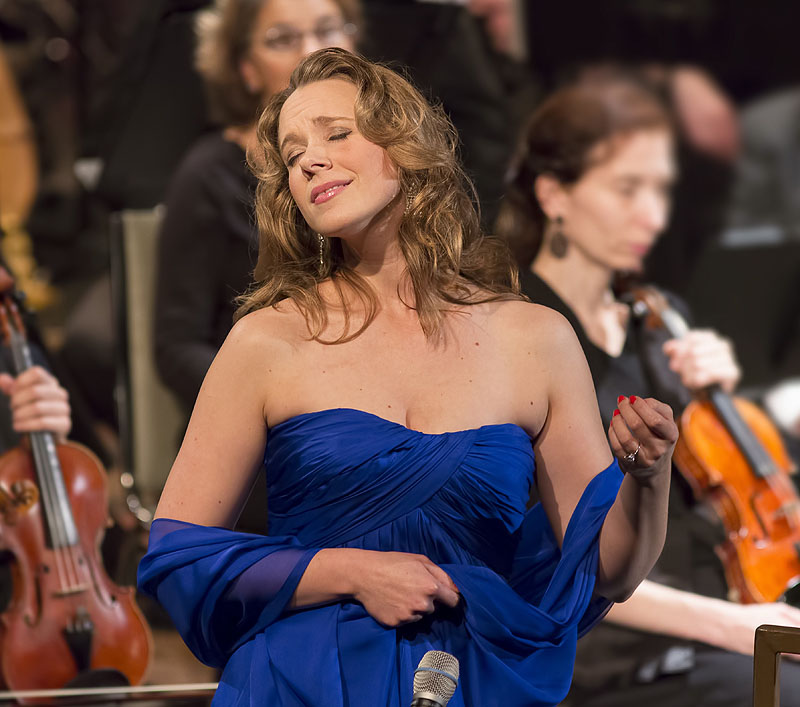Suzanne Nance wears two distinct, but related, hats. You might recognize her name as the host of “Morning Classical Music with Suzanne Nance,” which airs weekdays from 9 a.m. to noon on Maine Public Radio.
Or maybe you’ve had the privilege of hearing the woman with the celebrated soprano voice perform live. She has been singing on Maine stages such as Merrill Auditorium for several years, and has also sung in Prague, Chicago, Boston, London and New York, where she’s appeared in operas including Mozart’s “Cosi Fan Tutte,” Puccini’s “Madama Butterfly” and Adamo’s “Little Women.” You can follow her online at suzannenance.com.
Originally from the Newtown Square area of Philadelphia, Nance now calls Cape Elizabeth home. GO floated some questions her way about how she found her way into classical music, when she found her voice and more.
When and how did you first become interested in classical music?
Two pieces were instrumental in turning me on to classical music. Schubert’s “Ave Maria” and Puccini’s aria “O Mio Babbino Caro” are works that changed my life. The power of the music and the beauty of the languages was overwhelming. When I first heard “Ave Maria” pouring over me from a choir loft, I knew that I was meant to sing. I just knew it. Music had found me!
How about singing?
My friends dared me to audition for the school musical in high school. I went down the hall to the auditorium, waited in line (in my cheerleading uniform) and then sang “The Star Spangled Banner” for the audition. I remember coming home from school the next day to tell my mom that I had landed a lead role in the school musical, “The Music Man.”
When I told her the good news, she replied, “But you’ll have to sing. … Do you really sing?” And I replied, “Yes, I do!” That was how it all started, and after “The Music Man,” I was hooked. The stage felt like home. I was offered a contract to sing jazz in Philadelphia three years later, when I was 19 years old, but my mother decided that was not the right road for me, and encouraged me to return to Syracuse University to study classical music and opera.
It was the right decision. For me, opera seemed like musical theater times 100. It is grand theater, costumes, passionate singing without amplification, languages, drama, comedy, divas (and divos)! What could be better?
Who is one of your favorite singers?
I love Maria Callas. She was a true artist, and was a slave to her life as a singer/actor. When I hear Callas’ recordings, my heart breaks. The fragility of her voice slays me. It’s like a rare diamond, beautiful and fragile, yet possessing the ability to cut glass.
If you could have dinner with any composer, who would it be and why?
Erik Satie, for sure! Satie collected interesting things such as umbrellas, velvet suits and other people’s love letters! I’m fascinated by Erik Satie and love his music. Also, I’d love to dine with Hildegard von Bingen. She was an amazing woman, composer and mystic who lived in the 12th century. Her writings are extraordinary and timeless. Her music is hauntingly beautiful, and has survived for over 800 years.
What was a recent performance experience that was particularly special or memorable?
In October of last year, Robert Moody, music director of the Portland Symphony Orchestra, asked me to sing “A Letter from Sullivan Ballou,” which is a musical setting by John Kander of a famous letter written during the Civil War. It is a challenging piece that is demanding for both performer and audience. Moody had performed the piece with soprano Renee Fleming, for whom it is written, and convinced me that it would be good for me. At the end of the piece, as I looked around Waterville Opera House, there were many teary eyes, and you could hear a pin drop. It was a magical moment.
If you could tell young people one thing about classical music, what would it be?
I would encourage them to make music themselves and attend concerts. It’s great to get as close to the stage as possible for early experiences to see and hear the instruments up close and personal. It’s also great to go to solo and chamber music events. There is something about the intimacy of smaller classical music ensembles that can draw one in to the experience. However, there is nothing like hearing 80 to 100 musicians tuning before a conductor walks out on stage and raises his/her baton. Then … magic!
Staff Writer Aimsel Ponti can be contacted at 791-6455 or at:
aponti@pressherald.com
Send questions/comments to the editors.




Success. Please wait for the page to reload. If the page does not reload within 5 seconds, please refresh the page.
Enter your email and password to access comments.
Hi, to comment on stories you must . This profile is in addition to your subscription and website login.
Already have a commenting profile? .
Invalid username/password.
Please check your email to confirm and complete your registration.
Only subscribers are eligible to post comments. Please subscribe or login first for digital access. Here’s why.
Use the form below to reset your password. When you've submitted your account email, we will send an email with a reset code.